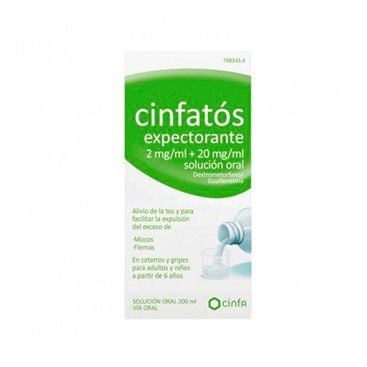Cinfatos Expectorant 2 Mg/Ml + 20 Mg/Ml Oral Solution 200 Ml (Pet)
Cinfatos Expectorante Oral Solution is indicated for the relief of cough and to facilitate the expulsion of excess mucus and phlegm in colds and flu for adults and children from 6 years of age. Cinfatos expectorante in english is available in our website.
Cinfatos Expectorante Oral Solution is indicated for the relief of cough and to facilitate the expulsion of excess mucus and phlegm in colds and flu for adults and children from 6 years of age. Cinfatos expectorante in english is available in our website.
Cinfatos Expectorant (2 Mg/Ml + 20 Mg/Ml Oral Solution 200 Ml (Pet))
Dextromethorphan hydrobromide/Guaiphenesin
Similar to Musinex in Spain
Summary:
Cinfatos Expectorant is an oral solution combining dextromethorphan, a central antitussive, and guaifenesin, an expectorant. It is indicated for the symptomatic treatment of dry, unproductive coughs associated with catarrhal processes, including irritative or nervous coughs, and cases requiring expectoration support.
Action and Mechanism
- Dextromethorphan: Central antitussive, suppresses the cough reflex.
- Guaifenesin: Expectorant, promotes the clearance of mucus.
Indications
For the symptomatic relief of:
- Dry, unproductive coughs (irritative or nervous cough).
- Catarrhal processes with associated expectoration.
Dosage and Administration
Oral Solution
- Adults: 1-2 teaspoons (5-10 mL containing 10-20 mg of dextromethorphan) every 4-6 hours. Do not exceed 60 mL (120 mg dextromethorphan) in 24 hours.
- Children (6-12 years): ½-1 teaspoon (2.5-5 mL containing 5-10 mg of dextromethorphan) every 4-6 hours. Do not exceed 30 mL (60 mg dextromethorphan) in 24 hours.
Liver Impairment:
Reduce the dose by half.
Administration Guidelines
- The oral solution can be taken directly or mixed with other liquids.
- Drink a glass of water after each dose.
- Adequate hydration is recommended throughout treatment.
Contraindications
Do not use in cases of:
- Hypersensitivity to dextromethorphan, guaifenesin, or excipients.
- Respiratory insufficiency.
- Asthmatic cough or cough with excessive mucus.
- Concomitant or recent (within 2 weeks) treatment with MAO inhibitors.
Precautions
- Persistent Cough: Use cautiously in chronic or persistent coughs (e.g., due to smoking, asthma, or respiratory diseases).
- Children: Not recommended for children under 2 years without a physician’s advice.
- Drowsiness: May impair the ability to drive or operate machinery.
- Alcohol: Avoid alcohol during treatment.
- Liver Disease: Monitor for drug accumulation in hepatic impairment. Adjust dosage as needed.
- Heart/Kidney Disease: Caution in patients with cardiac or renal conditions, hypertension, diabetes, epilepsy, or chronic alcoholism.
- Dependency and Abuse: Rare but possible; monitor for misuse signs.
Excipients: Contains sorbitol; avoid in hereditary fructose intolerance.
Warnings
- Monitor for abuse signs in patients, especially children.
- Avoid use with MAOI antidepressants; maintain a 14-day gap.
- Drowsiness may occur; exercise caution when driving or using heavy machinery.
Interactions
- Antiarrhythmics: Risk of dextromethorphan toxicity.
- Antidepressants (MAOIs, SSRIs): Potentially fatal serotonin syndrome.
- NSAIDs (e.g., celecoxib): May increase dextromethorphan levels.
- Expectorants: Risk of airway obstruction due to excessive secretions.
- CNS Depressants: Enhanced sedative effects.
Use During Pregnancy and Lactation
- Pregnancy: Limited data; not recommended.
- Lactation: Uncertain excretion in breast milk; avoid use or discontinue breastfeeding.
Special Populations
- Children: Safety not established under 2 years. Older children may experience fewer side effects than codeine.
- Elderly: Use with caution due to increased susceptibility to adverse effects.
Adverse Reactions
Reported effects include:
- Digestive: Nausea, vomiting, constipation.
- Neurological: Drowsiness, dizziness, headache, confusion.
- Allergic: Rash, urticaria.
Overdose
Symptoms: Nausea, vomiting, dizziness, sedation, respiratory depression, and in rare cases, coma or toxic psychosis.
Treatment: Gastric lavage, activated charcoal, naloxone for respiratory depression, and symptomatic management.
Patient Advice
- Drink plenty of water during treatment.
- Avoid driving or using machinery if drowsy.
- Inform a doctor if cough persists beyond a week or if symptoms worsen.
Leaflet Cinfatos Expectorant 2 Mg/Ml + 20 Mg/Ml Oral Solution 200 Ml (Pet)




